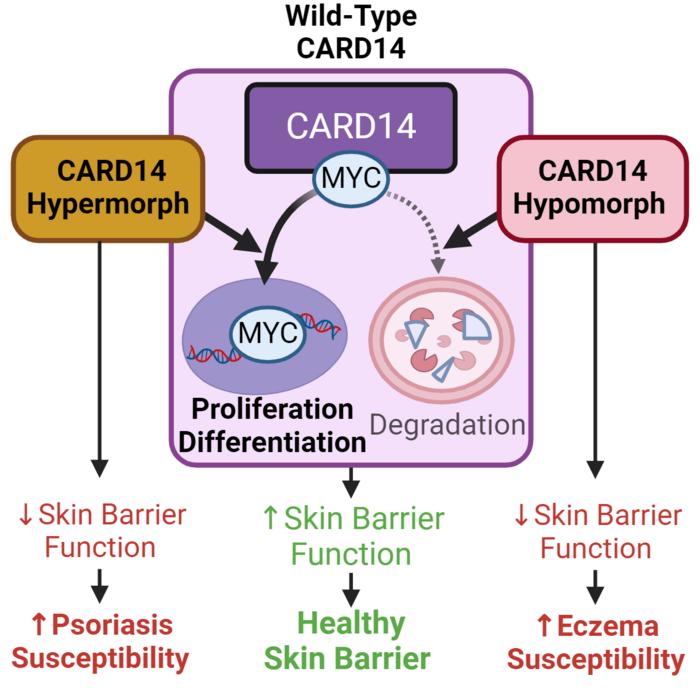A novel molecular signaling pathway involving the protein CARD14 may play a crucial role in maintaining skin barrier, finds a study inCell Reports.
“We found that CARD14 directly binds and regulates MYC, a protein involved in controlling cell growth that can contribute to cancer when it malfunctions,” says study author Stanley DeVore, PhD, a graduate student at Cincinnati Children’s in Ohio, in a news release. “Our study shows that the proper interaction between these two proteins is important for a healthy skin barrier and protecting against eczema and psoriasis. Additionally, given the association of MYC with cancer, our findings also suggest that dysfunctional CARD14-MYC signaling may contribute to certain types of cancer throughout the body.”
Previous research has focused on the CARD14-NFκB signaling pathway, which is thought to promote psoriatic diseases when elevated and to promote atopic dermatitis when reduced.
“However, that model does not fully explain the variability in CARD14-driven diseases,” adds Gurjit K Khurana Hershey, MD, PhD , who directs the Division of Asthma Research at Cincinnati Children’s. “This new CARD14-MYC signaling pathway strengthens the link between CARD14 and skin barrier health. Its signals regulate the function of MYC in the most common type of skin cell.”
CARD14 regulates skin barrier function through two mechanisms: stimulating NFκB to establish an antimicrobial barrier and stimulating MYC to help build a physical barrier, the researchers note.
The study further explores how various mutations in CARD14 can promote different skin diseases, including AD and psoriasis. Importantly, the study reports that altered CARD14-MYC signaling could affect barrier function and allergic diseases in other tissues, contributing to asthma by affecting airway tissue linings or contributing to eosinophilic esophagitis by affecting the digestive tract. The novel pathway may also contribute to certain cancers that begin in epithelial tissues.
Next steps
DeVore says the hunt is on to identify small-molecule agents that can safely influence the CARD14-MYC pathway. In fact, aspects of the study have been included in a recent patent filing.
“Our ultimate goal is to develop novel therapeutics,” DeVore says. “We also are conducting studies aimed at identifying cancers that may be affected by CARD14-MYC signaling.”
The study authors plan to share their findings at the 2025 Joint Conference of the American Academy of Allergy, Asthma and Immunology (AAAAI) and the World Allergy Organization (WAO).
PHOTO CAPTION: CARD14 directly binds and regulates MYC, a protein involved in controlling cell growth that can contribute to cancer when it malfunctions. A study published in Cell Reports shows that the proper interaction between these two proteins is important for a healthy skin barrier.
PHOTO CREDIT: Cincinnati Children’s


